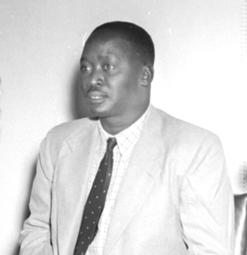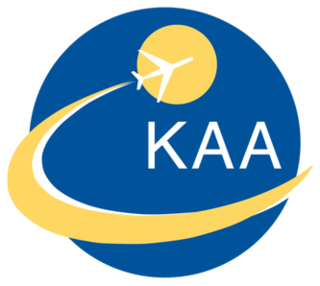
The Luo are several ethnically and linguistically related Nilotic ethnic groups that inhabit an area ranging from Egypt and Sudan to South Sudan and Ethiopia, through Northern Uganda and eastern Congo (DRC), into western Kenya, and the Mara Region of Tanzania. Their Luo languages belong to the western branch of the Nilotic language family.

Jaramogi Ajuma Oginga Odinga was a Kenyan politician who became a prominent figure in Kenya's struggle for independence. He served as Kenya's first vice-president, and thereafter as opposition leader. Odinga's son Raila Odinga is a former prime minister, and another son, Oburu Odinga, is a former assistant minister in the Ministry of Finance.

Kisumu is the third-largest city in Kenya after the capital, Nairobi, and Mombasa. It is the second-largest city after Kampala in the Lake Victoria Basin. The city has a population of slightly over 600,000. The metro region, including Maseno and Ahero, has a population of 1,155,574 people according to the 2019 Kenya Population and Housing Census which was conducted by the Kenya National Bureau of Statistics.
Maseno University is a public university based in the Maseno district of the Kisumu County, Kenya, along the Equator. It was fully fledged as a university in 2001, after being a constituent college of Moi University for a decade. It has over 10,000 students pursuing programmes offered in the university campuses and it is currently ranked among the best universities in Kenya.

Nakuru is a city in the Rift Valley region of Kenya. It is the capital of Nakuru County, and is the third largest urban area in Kenya. As of 2019, Nakuru has an urban population of 570,674, making it the largest urban centre in the Rift Valley, succeeding Eldoret, Uasin Gishu County. The city lies along the Nairobi–Nakuru Highway, 160 kilometres (99 mi) from Nairobi.

Grace Emily Ogot was a Kenyan author, nurse, journalist, politician and diplomat. Together with Charity Waciuma she was the first Anglophone female Kenyan writer to be published. She was one of the first Kenyan members of parliament and she became an assistant minister.

The Luo of Kenya and Tanzania are a Nilotic ethnic group native to western Kenya and the Mara Region of northern Tanzania in East Africa. The Luo are the fourth-largest ethnic group (10.65%) in Kenya, after the Kikuyu (17.13%), the Luhya (14.35%) and the Kalenjin (13.37%). The Tanzanian Luo population was estimated at 1.1 million in 2001 and 3.4 million in 2020. They are part of a larger group of related Luo peoples who inhabit an area ranging from South Sudan, southwestern Ethiopia, northern and eastern Uganda, southwestern Kenya, and northern Tanzania, making them the largest ethnic group in East Africa.

Kenyatta University (KU) is a public research university with its main campus in Nairobi, Kenya. It acquired the status of university in 1985, being the third university after University of Nairobi (1970) and Moi University (1984). As of October 2014, it was one of 23 public universities in the country.

Kisumu County is one of 47 counties in the Republic of Kenya. Its borders follow those of the original Kisumu District, one of the former administrative districts of the former Nyanza Province in western Kenya. Its headquarters is Kisumu City which is the third largest city in Kenya after the capital Nairobi and the coastal city of Mombasa. It has a population of 1,155,574. The land area of Kisumu County totals 2085.9 km2.
David William Cohen is Emeritus Professor of History and Anthropology at the University of Michigan. He specializes in East Africa and is a leader in the emerging field of historical anthropology. He is Honorary Research Fellow, Archive and Public Culture Initiative, University of Cape Town.

Kenya Airports Authority (KAA) is the owner and operator of nine civilian airports and airstrips in Kenya. Kenya Airports Authority was established by an act of Parliament in 1992, by the ruling Kenya African National Union government. The KAA Act, Cap 395, provides for the powers and functions of the Authority. Its head office is on the property of Jomo Kenyatta International Airport in Embakasi, Nairobi.

Jomo Kenyatta University of Agriculture and Technology (JKUAT) is a public university that is situated in Juja, 36 kilometres northeast of Nairobi, along the Nairobi-Thika SuperHighway, off Exit 15. It offers courses in Technology, Engineering, Science, Commerce, Management and Building sciences and holds a strong research interest in the areas of biotechnology and engineering. Notable alumni include Dr. Paul Chepkwony, the first governor of Kericho County in Kenya and a former lecturer, Emma Miloyo, a prominent Kenyan architect and the first female president of the Architectural Association of Kenya, as well as Aden Duale, the former Leader of Majority in the 11th Kenyan Parliament among others. As at 2023, the Vice Chancellor of the University was Prof. Victoria Ngumi.
Dr. Elisha Kipyegon Taaitta Arap Toweett, also known as Taaitta Arap Toweett, was a scholar, writer, linguist and a Kenyan politician.

Maseno School, located in Kisumu County in Kenya, is one of the oldest formal education schools in the country.

Kisumu Rugby Football Club is a Kenyan rugby union club based in Kisumu. Also known as Lakeside RFC, for the 2015–16 season the club competes in the Nationwide League.

Professor David Peter Simon Wasawo was a Kenyan zoologist, conservationist, and university administrator. After studying at Uganda's Makerere University he earned an M.A. at the University of Oxford and a PhD at University of London. He taught at Makerere University, and was Professor and Dean of the Faculty of Science at the University of Nairobi, and later chancellor of Great Lakes University of Kisumu.
George Albert Omore Magoha was a Kenyan consultant surgeon, academic administrator and technocrat, who served as a Professor of Surgery at Maseno University's School of Medicine, in Kisumu County as from 17 January 2023 till his death.
The Luo Union was a welfare organisation formed in Nairobi, Kenya, in the early 1920s. This organisation sought to create, expand and govern a general cultural identity among Luo people in East Africa. Luo people are a Nilotic ethnic group native to western Kenya and the Mara Region of northern Tanzania in East Africa. The Luo Union was one of several welfare organisations started during the colonial period in East Africa which aimed at building broad cultural unity. This organisation played a crucial role in creating a collective sense of identity and unity amongst Luo people after the Second World War. It was also an important medium of grassroots political support for African Nationalist movements in the 1950s. The Luo Union FC was the unions soccer club. This club would later become Gor Mahia FC, one of Kenya's best performing football clubs.













